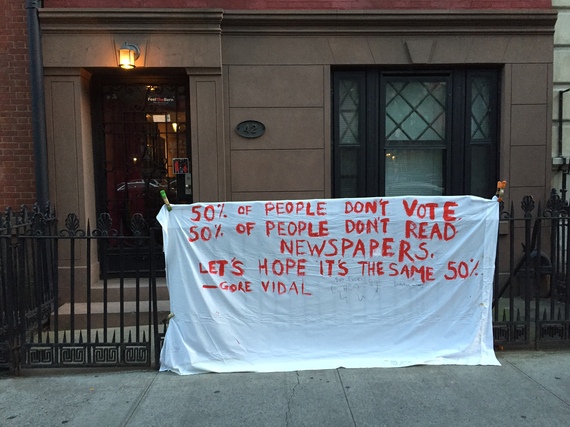Election day was sunny in Brooklyn. I rode my bike to the public school in Carroll Gardens where I vote. The line snaked out the door. Inside, the gymnasium was packed with voters, poll workers and machines. I was smiling, sensing that a majority of voters in this corner of America were probably Hillary supporters. Hours later, I was nursing my shock with red wine and late night calls to like-minded friends across the country.
Although Hillary Clinton received at least two million (maybe more by the time you read this) more votes, Donald Trump is our President-elect. Trump won fair and square because in the United States it's not about one person, one vote -- when it comes to Presidential elections. And if this moment doesn't convince you that reforming the electoral college is perhaps one of the most important issues facing our democracy, ponder this.
What might life in America be like today had Al Gore won the presidency in 2000. Perhaps the United States wouldn't have invaded Iraq? Maybe we would have realized the economic potential of sustainable energy? Would we have gone through the nightmares triggered by the economic collapse of 2008? Would the country have gone so far off the rails, so sadly detached from reality that a vast segment of our people gave rise to Donald Trump?
People forget that Al Gore won the popular vote by around 500,000 votes because in the end, the electoral college's archaic-assed winner-take-all system shifted our focus to those few hundred votes in south Florida which led to court challenges, a Supreme Court decision and President George W. Bush. Some have pointed to that moment as the onset of our current infection of deep national division, those days planted the seeds of a crisis of confidence in democracy itself.
And just like Al Gore, Hillary Clinton won the popular vote for President. Just to put it out there, there's no doubt, if the shoe were on the other foot in this current situation, Trump supporters would be raising hell charging as their leader did for the past few months, that the system is rigged.
Well, truth be told, Trump's right, the way we choose our president is in fact rigged against democracy. Every American vote should hold the same weight, no matter where you live. Under the current Electoral College system, votes are not equal in value, and that in itself should inspire all Americans who support the idea of a fair, representative democracy, to get on the electoral college reform bus right now, while the skillets hot.
The Constitution explicitly says that states can alter the way they pick their electors: delegates who meet and officially pick the president in December. There is a non-partisan movement gaining steam in statehouses across the country called the National Popular Vote Interstate Compact that would reform the Electoral College and guarantee the Presidency to the candidate who receives the most popular votes while preserving the state-controlled electoral college.
"Our movement has nothing to do with a single election - or the outcome of a single election. We believe that in every presidential election battleground states and their voters have too much power and fly-over states have none," said Patrick Rosenstiel - Senior Consultant to National Popular Vote, the group spearheading the movement.
The National Popular Vote Interstate Compact is a statute that would take effect once enacted by state governments possessing a majority of the electoral votes -- that is, enough to elect a President at least 270 out of the possible 538.
So far, eleven states with 165 electoral votes -- or 61 percent of the 270 necessary to activate the compact -- have passed it.
"We have bills introduced in all fifty states and we work at it every day," said Rosenstiel.
Imagine living in solid red Alabama or deep blue New York City and knowing that when you cast your vote, it would carry just as much weight in a national election as a vote cast in Ohio or Florida. There's little doubt that voter participation would skyrocket as voters began to understand and accept the responsibility that every vote, no matter where it gets cast, counts and could determine the outcome of an election.
Even President Elect Donald Trump has called the current electoral college system "a disaster for democracy."
"We are Republicans, Democrats and Independents who believe that all American voters should have a meaningful voice in presidential elections. The time to act is now," said Rosenstiel.
Still, the popular vote movement is not without critics. In a 2000 Cato Institute essay, John Samples wrote "If the Founders had wished to create a pure democracy, they would have done so." He says with a popular vote, we would probably see elections dominated by the most populous regions of the country or by several large metropolitan areas.
But, why is going where the people are such a bad thing?
Given the logistics of campaigning in such a large country, it makes perfect sense that a candidate would spend time and resources where it is going to do the most good, for a majority of Americans.
"If citizens stand up and demand reform from their state legislators - demand that they support the National Popular Vote bill - we will have a national popular vote election in 2020," said Rosenstiel.
Voters interested in getting involved should visit nationalpopularvote.com; and get educated that this is the best and most constitutional way to make the reform they seek and then write your legislator. He said the movement needs legislators across the country exercising their constitutional duty to reform a system that leaves too many Americans behind.
"Get engaged, get involved, demand action. We need 2020 to be the first presidential election where every voter, in every state, is relevant in the presidential election," said Rosenstiel.

